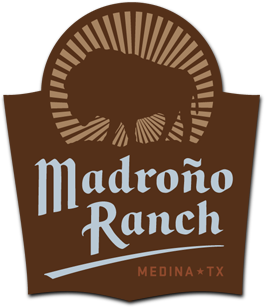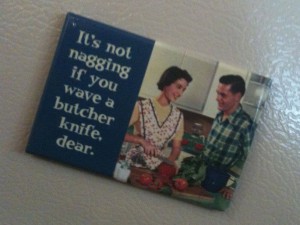“It is true, I came as near as is possible to come to being a hunter and miss it, myself….” (Henry David Thoreau)
I spent last weekend in the company of six heavily armed women at Madroño Ranch.
Don ’t worry; we’re not training up a secret army of Sarah Palin clones. No, these Hill Country Dianas were attending “Hunting School for Women,” our first ethical hunting workshop of the new season. Jesse Griffiths of Austin’s Dai Due Butcher Shop and Supper Club decided to limit the enrollment to six rather than the usual eight, since five of the six were first-timers and he wanted to make sure they received as close to a one-on-one experience with a guide as possible.
The weekend was a huge success, at least from our perspective, and while I know I shouldn’t make sweeping generalizations based on such a small sample size, I couldn’t help concluding that most women are more likely to “get” the whole ethical hunting thing, and more willing to listen and learn, than most men. (Of course, if I simply substituted “inexperienced hunters” for “women” and “experienced hunters” for “men,” that statement would be equally true; perhaps the most important factor in making this school so successful was the fact that five out of the six attendees were novices, not that all six were women.) For whatever reason, though, the weekend was as far removed as possible from the boys’-night-out mentality that prevails in some hunting circles, for which we’re grateful.
The ringer in the group was our dear friend Valerie, an experienced hunter and a regular customer of Jesse’s at the Sustainable Food Center’s Saturday morning farmers’ market in downtown Austin. In addition to her hunting expertise, Valerie brought a wicked sense of humor to the proceedings; she was the one who affixed the full-page PETA ad of Sir Paul McCartney proudly proclaiming his vegetarianism to the Madroño Ranch refrigerator, just below the inspirational magnet pictured above.
Helping Jesse and the multitalented Tink Pinkard make sure everything ran smoothly were Morgan Angelone, the phenomenal Dai Due “camp chef”; our daughter Elizabeth, the assistant chef; Jeremy Nobles and Josh Randolph, the trusty guides; and our son Tito, the assistant guide.
As if that weren’t enough of a hunting vibe, we also had two residents at the ranch: Jackson Landers, a hunter/author from Virginia, and Helena Svedberg, a student of environmental filmmaking at American University who is filming him for her master’s project.
It was, in other words, a fairly bloodthirsty group. But as Robert, our redoubtable ranch manager, told the guests, we provide an opportunity for them to hunt; we do not, and cannot, promise them that they will kill, or even see, an animal. In the event, five of the six guests did register kills from our blinds, and all six went home with coolers full of venison and/or hog meat.
All in all, then, we’re happily counting Hunting School for Women as a win. But coming on the heels of our second bison “harvest,” it has us (again) thinking long and hard about our somewhat vexed attitude toward meat eating.
Now, I take a back seat to no one in my appreciation of meat. Morgan’s bison burgers (a Friday night hunting school tradition), Jesse’s charcuterie, Ben Willcott’s pork Milanese at Texas French Bread—these are among my very favorite things to eat. And we happily accepted Valerie’s invitation to come over for dinner once she’s turned the 130-pound feral hog she shot into pork curry or some other delectable dish. But neither Heather nor I is a hunter; the only animal I’ve ever shot was an obviously deranged raccoon, presumably rabid, that we encountered staggering along the road at the ranch at midday on a scorching summer day several years ago.
In other words, while we certainly hope to make enough money from the sale of our bison meat to help support our residency program, and while we understand the need to control the deer and hog populations not just for the sake of a balanced ecosystem at the ranch, but for the good of the animals themselves (no one likes to see the starving individuals that result from overpopulation), we are a little, um, squeamish about doing the deed ourselves. Instead we are, in effect, allowing Jesse and Tink and Robert and the hunting school guests to do our dirty work. Does this make us hypocrites? Wouldn’t it be more honest for us to take rifle in hand and take care of this business ourselves?
Well, yes. Honestly, I don’t think I have a huge problem with the general concept of killing a feral hog, or even a deer, though I’ve been warned about the dreaded Bambi effect. (The bison, I confess, are a different story; they are so big, so magnificent, so valuable, that I’d be intimidated if I were the one required to shoot them.) What bothers me is the possibility that I might not be a sufficiently good shot, despite the numbers of beer cans and paper targets I’ve blasted over the years; I would agonize over the possibility that, due to my incompetence, the animal might not die instantly.
Of course I also understand that for us hunting would be a luxury, as it is for many enthusiastic hunters, and not a necessity; we are lucky to have other people who kill and process our food before we buy and cook and eat it. Moreover, not everyone can, or should, be a hunter; a healthy human ecology requires diversity and balance—vegetarians and vegans as well as carnivores; urban hipsters and rural rednecks; multinational corporations (well regulated, please!) and corner stores; butchers, bakers, candlestick makers. There should be room at the table for all.
That said, however, I believe firmly that every carnivore should, at some level, confront the meaning of meat: the death, blood, evisceration, and butchering that are inextricable parts of the process by which this chop or that sausage ends up on our dinner table. We’ve seen that process up close and personal during bison harvests and hunting schools at the ranch, and at the processing facility in Utopia that turns our bison carcasses into stew meat and steaks. But we haven’t actually pulled the trigger or wielded the knife ourselves—not yet, anyway. Perhaps we never will. But I hope we will always be uneasy about that fact, and thankful for the animals whose flesh we eat, and for those who allow us to do so.
What we’re reading
Heather: The Sun
Martin: Anthony Trollope, The Warden


Great post, Martin. My full-time job is with Texas Parks and Wildlife, and before taking the position (producing a statewide radio series about the outdoors), I had not been exposed to hunting, and wasn’t sure how I would feel about it. Over the past 10 years, I have met some of the most humane people who are also hunters. None takes lightly the dispatching of a life (even a feral hog). And one game warden told me that when you stop feeling a tug at your heart after killing an animal–then it’s time to quit the sport. I am not a hunter–yet–either, but perhaps one day I will muster the courage to take that next step. I would not hunt for a trophy, but for meat for the table. In the end, you cannot get more sustainable than that.
Thanks for the thoughtful comment, Cecilia. It’s certainly been our experience as well that “some of the most humane people… are also hunters.” Hey, maybe one of these days you should apply for a residency at a certain Hill Country ranch? We’d love to talk you into it over coffee some time.
Thanks for the thoughtful approach to hunting. While I have no interest in killing a mammal, I don’t feel the same way about birds. I like to go bird-hunting in the fall, and I think the birds are nearly always safe because I am such a poor shot. Thanks for sharing your thoughts; they are always thought provoking. Keep up the good work.